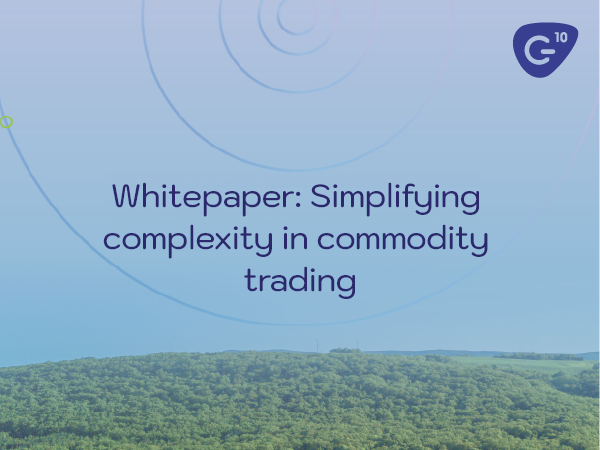Next week, Gen10 will be taking part in Commodity Trading Week – 5 days of virtual conferences discussing the main challenges and opportunities in risk, logistics and trading. In preparation for the Supply Chain & Logistics Conference as part of the event, we are exploring some of the many areas where technology can support commodity supply chains now and in the future:
Digital transformation
Many organisations within commodity supply chains are familiar with CTRM technology, which supports risk management and trading teams, and awareness of the wider commodity management software category is also growing. Commodity management provides all the benefits of a CTRM as standard, but extends further to support supply chain processes such as logistics, scheduling and warehousing within one continuous system.
Implementing the right commodity management system has the potential to digitally transform your business. Digital transformation done well goes beyond simply using new software – it is the process of using technology to radically improve standard operating procedures and generate better results for the business.
Modern commodity management systems can power digital transformation, not only for the teams directly using them, but across the business, by integrating with other software such as an ERP to create a commodity management ecosystem. An ecosystem means that each department is using the best software for themselves, but collaborating across the business in real-time as data is shared as if they were all using one system. And as well as the benefits they bring to day-to-day business processes, commodity management ecosystems can make future digital transformation initiatives even easier.
Operational efficiency and risk
There are many ways commodity management software can improve efficiency and mitigate risks in supply chain roles. This can include operational risk controls such as automatically checking that lots added to a shipment are within the contract’s tolerance; for example, for weights and assays. Other risk management can include freight risks and financial instruments such as freight derivatives management.
And operational risk is further brought under control by the collaborative nature of commodity management technology. Each person using the system actively manages their tasks within it, rather than using it for reporting after-the-fact, reducing the risk of copying errors, reducing manual tasks that do not add value and providing a live view of all assets across the organisation. Operational risk and efficiency are improved even further if the commodity management includes automation, as is the case with Gen10’s CommOS.
Automation
Gen10’s Pricing.Engine automatically converts between units such as between packaging types or weights, and automatically calculates totals, not only for pricing, but for ensuring shipment weights match the contract specifications, managing multi-modal shipping and more.
Automation also paves the way for collaboration without being held back by emails and manual tasks. Your organisation sets workflows for each contract to follow, and shipments are automatically progressed through these workflows as each individual completes their own part of the process. For example, an operations team can be notified every time a new contract is signed, and they need to step in, or they can add inspections so that shipments are automatically progressed to the inspection stage when relevant.
Automation can also play an important role in simplifying tasks when things change. For example, some tasks in CommOS can have due dates dependent on future actions, such as completing an Ocean Bill of Lading 10 days before a vessel is due in port. If the estimated arrival date changes, the operator can recalculate any of these dependent deadlines in their team’s calendar at the click of a button.
If you create a commodity management ecosystem with 2-way integrations between systems, this also makes use of automation. The integrations automatically share data between the different software systems so that it can be used instantly by colleagues elsewhere; accelerating processes, providing accurate real-time reports, and improving asset management and turnover.
Decarbonisation
As decarbonisation is set to continue and place greater demands on commodity supply chains, there are a number of ways commodity management technology can support decarbonisation in operations. In CommOS, if lifecycle emissions need to be updated after transportation, these can be incorporated into the workflows to ensure they are fully compliant with emerging regulations. CommOS also has the ability to add carbon pricing to shipments, stock or contracts, meaning that our clients are ready for the future of carbon markets.
Sustainability
Commodity management ecosystems can provide greater control and transparency for sustainability, traceability and provenance initiatives than a traditional CTRM or even a stand-alone commodity management system.
For example, CommOS includes certificate management as part of its CRM, with alerts of upcoming expiry dates. Certificates attached to stock can be managed across your operations, even when splitting or blending lots, and CommOS creates a full digital audit trail so that you can provide assurance of origin to any supply chain partners. And the software integrations ensure these records are updated across all your digital systems and processes.
For in-depth supplier inspections, we also offer Aud.IT, a paperless mobile auditing app that can again integrate with your other commodity management software to fast-track and add additional assurance to due diligence practices and records.
Join us at Commodity Trading Week
We are looking forward to the Supply Chain & Logistics conference next week where you will be able to discuss all of these themes, and more, with industry professionals. We will also be available throughout all of Commodity Trading Week to discuss how each of these emerging trends applies to your business specifically. Book a meeting with our team via the event meetings tool or contact us now to arrange a call.
Want to read more?
Subscribe now for monthly updates
By submitting your details you agree that we can store your data and communicate with you. You can opt out of these communications at any time. Read all in our Privacy Policy.



